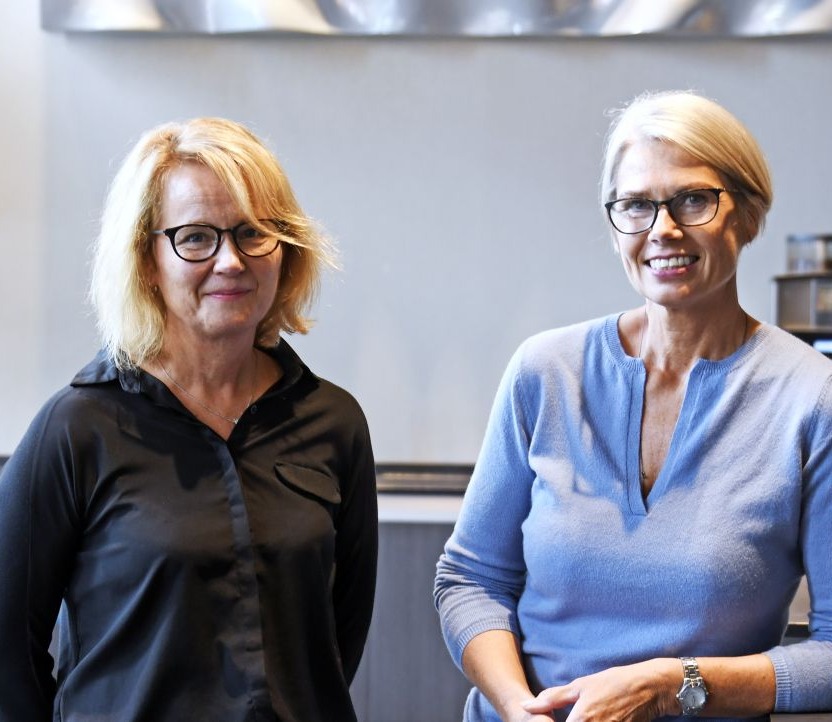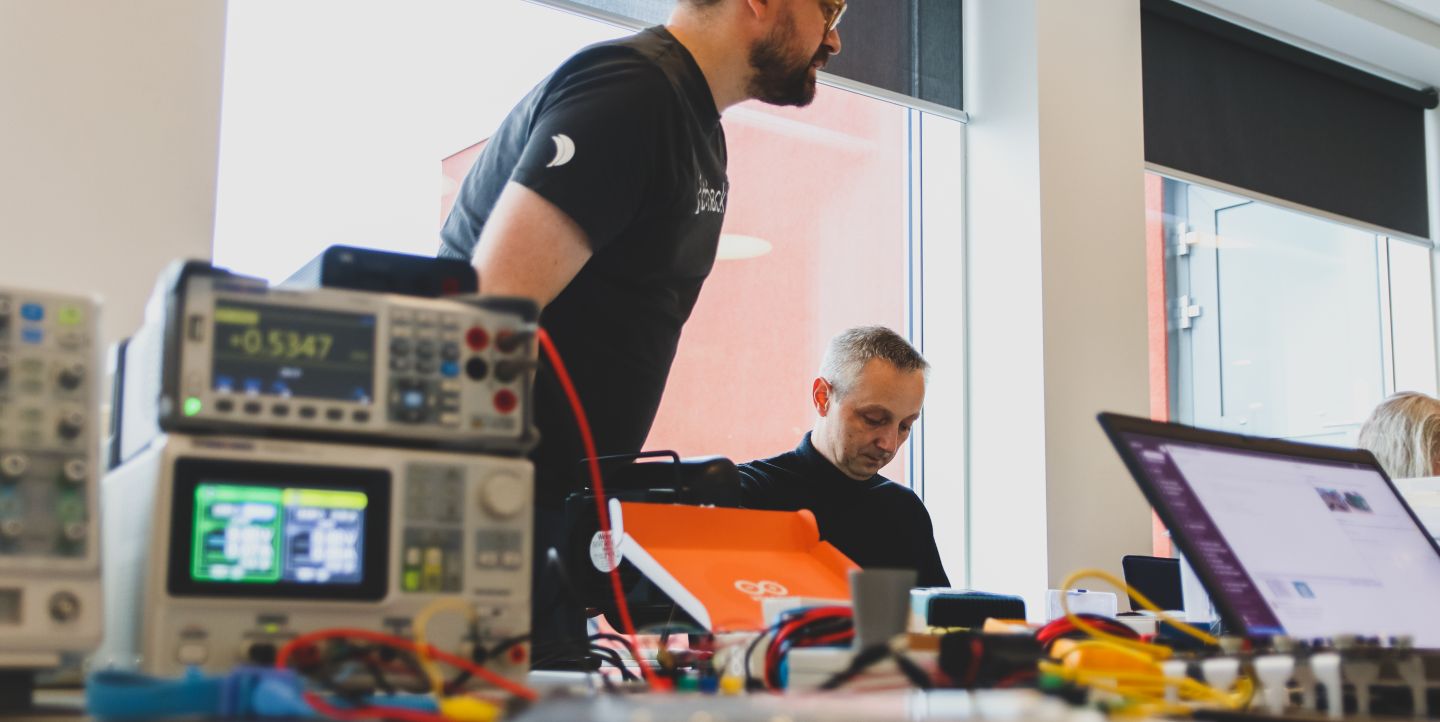Livet med Leger Uten Grenser - Never loose hope
Dato: 10. mars 2023
Never lose hope, my heart, miracles dwell in the invisible.
Rumi
DIPSer Anca Heyd har alltid hatt en drøm om å kunne bidra inn i Leger Uten Grenser og gi livreddende nødhjelp der det trengs mest. Siden 2020 har hun jobbet med feltarbeid både i Afghanistan og Jemen, og i år gikk turen til Haiti.
Les blogginnlegg 1 og blogginnlegg 3 fra turen til Haiti her.
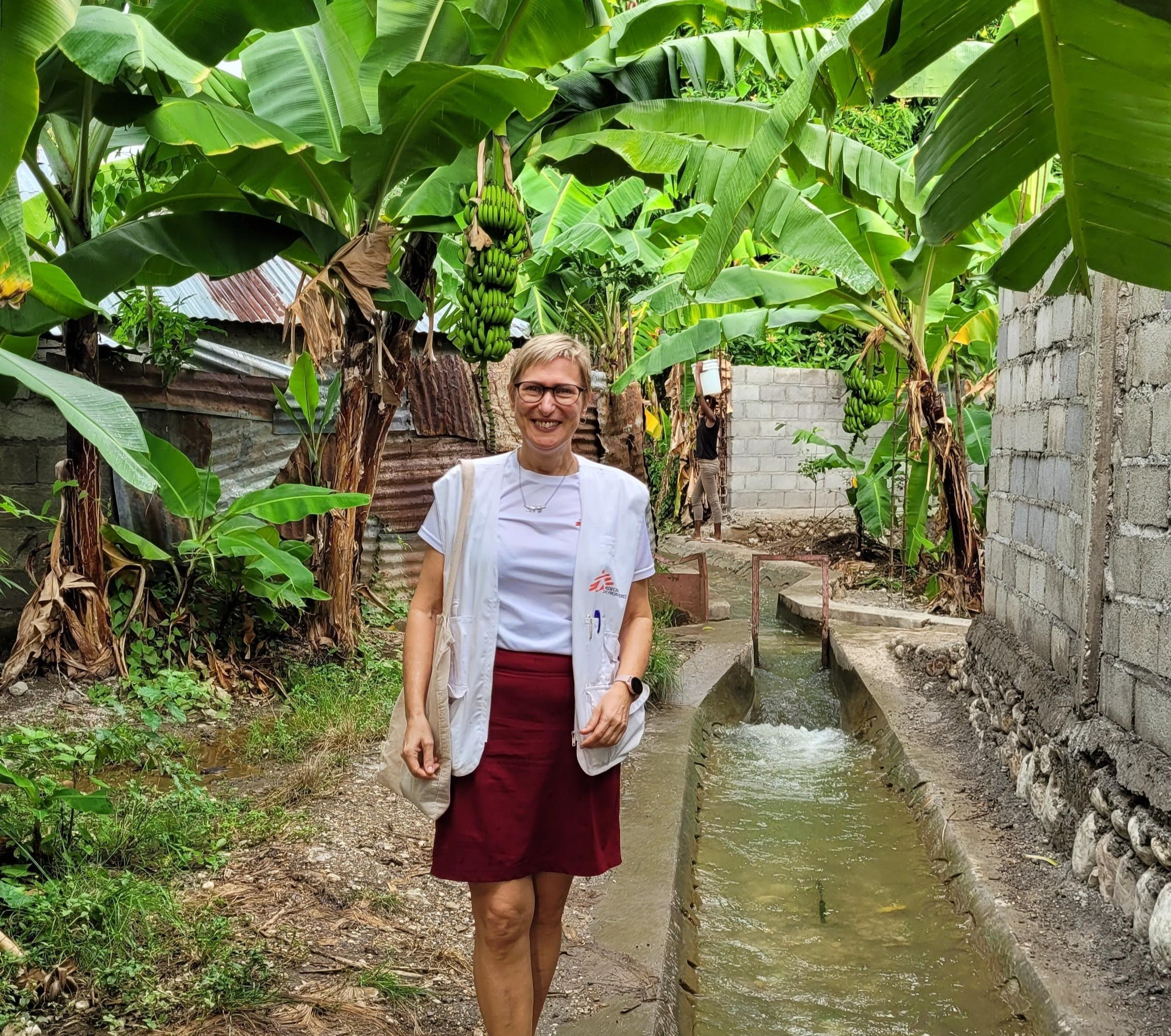
Foto: Anca på sykehuset i kledd uniformen sin
Litt om Anca Heyd:
Anca Heyd er legespesialist i fødselshjelp og kvinnesykdommer, og jobber som medisinsk rådgiver i DIPS. Hun kommer fra Tyskland, og hadde 14 års praksis fra klinisk arbeid og 4 år i ulike ledende stillinger i Helse Nord bak seg før hun kom til oss. I mange år har hun hatt en drøm om å kunne bidra inn i Leger Uten Grenser og gi livreddende nødhjelp der det trengs mest. I 2020 satt Anca satt seg på flyet ned til Afghanistan for å jobbe med feltarbeid. I 2022 gikk turen til Jemen. Og i 2023 falt oppdraget til Haiti.
#AncaBidrar
Fra Leger Uten Grenser sine hjemmesider kan man lese at landet Haiti befinner seg i en alvorlig økonomisk og politisk krise. Helsevesenet er på randen til kollaps, og det er mange helsebehov som ikke dekkes. Haiti er et av de fattigste landene i Amerika, og landet har flere ganger blitt rammet av naturkatastrofer. Ti år etter det katastrofale jordskjelvet i 2010 og 2021 er helsevesenet på randen til kollaps. Det er mye vold og i september 2022 brøt det også ut kolera.

Blogg 2: Never loose hope
Bloggen er på engelsk.
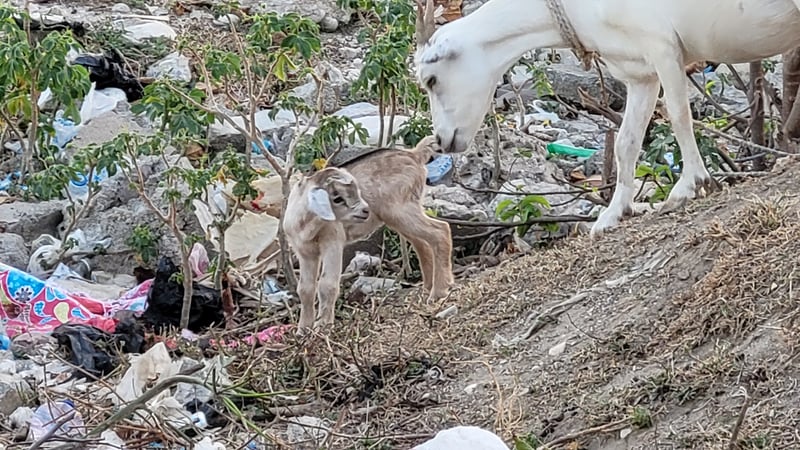
Foto: Mother baby hope
Monday. It's my first day at the small hospital. We have just had the daily report and are now about to start the rounds. We’re entering the room reserved for patients with complicated pregnancies and deliveries. To the right, four beds are aligned along the wall, all covered with mosquito nets. The sun shines through the windows above the beds and onto a small desk, which is placed on the left side, straight across from the beds.
This way it is easy for the midwife to keep an eye on her patients. Further back, in the corner, there is a small cupboard and a screen wall. It’s bed number two that catches our eye. The mosquito net is folded up.
*Judeline* lies there, wearing an orange hospital shirt, with small red flowers. The white painted metal bed with the MSF painted sheet on it seems huge compared to her little, thin body. I don't need more than a brief glance to understand that there is something wrong. She’s on her back, eyes and mouth half open. Her hair, which should be black (she is dark-skinned), is almost yellow and the skin on her body and face has a yellow-gray colour. She receives fluids through a needle in her right arm and has a urinary catheter. There is just under 30 ml in the bag and the color is, as they describe so well here, the same as Coca-Cola. The alarm bells in my head are ringing! We approach the bed, where the midwife is already impatiently waiting for us. We try to talk to Judeline, ask her to open her eyes. No response. We move her arms and legs. Everything is limp. We pinch her, inflict pain to see how she reacts. Not even then does she protest, she just barely moves her lips. She is in a deep coma.
We are trying to understand what happened. The information we have is sparse. She is 30 years old, and this is her first pregnancy. Yesterday she gave birth to a little boy, apparently uncomplicated. But after a while she started to have convulsions and the family took her, still convulsing, by car on the one-and-a-half-hour-long trip through the mountains to the nearest health centre. There, it has been established that she has eclampsia, a serious and life-threatening form of preeclampsia.
They have started the treatment with Magnesium Sulphate, a very effective but also very toxic medicine, and have sent her to us. After another two hours in an ambulance, on small winding roads, she has finally arrived. At arrival she was already unconscious and had another episode of convulsions. Her blood pressure was extremely elevated, and she had a fever. Infection or fever due to the cramps? No one knew, but we added antibiotics just in case and gave her blood pressure medication. We got her blood pressure under control, but her general condition has worsened.
Blood tests show that she has developed a HELLP syndrome, an even more serious form of preeclampsia. Lab results show liver failure, and her platelets are so low that we fear she will start bleeding. But right now, it is the reduced amount of urine that worries us the most. It is either a sign of severe kidney failure, or a reaction to the toxic medicine that we gave her for her eclampsia. We examine her and find that she has lost her reflexes; a clear sign of toxic reaction. We administer an antidote, hoping for the best. There is nothing more we can do today. We’ll have to wait and hope that she will recover. Hopefully she has not suffered permanent brain damage from her seizures.
I leave her with a heavy heart. I find some comfort in the fact that her little boy is doing well, and is well looked after in our neonatal unit.
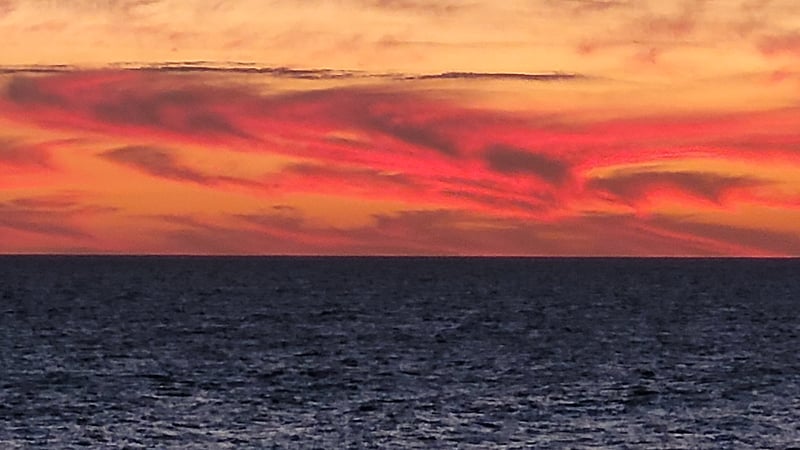 Foto: Sunset at Papim - view from the roof terrace of our house
Foto: Sunset at Papim - view from the roof terrace of our house
Tuesday
Tuesday. I open the door and look straight at bed number two. The urine bag is full! And the urine has a much lighter color. Yes! I think. Then I look at Judeline, freshly washed with a new shirt. White pattern this time. But the joy came too soon. Her condition is unchanged. She is still in the same deep coma, which we know is due to cerebral oedema. Also, her body is covered in sweat drops. It is very hot today, the sun shines straight into the room, there are no blinds or curtains. The fans are on full blast, but that doesn't help much. We've got a new problem. Judeline is dehydrated, which we also see in the blood tests.
Dare we give her fluids? If we give too much, it will worsen the brain oedema and she could develop pulmonary edema. If we give too little, there is the risk of blood clots and kidney failure. We decide to increase, very carefully. At the same time, we start looking - is there anything we can do for her cerebral oedema. We are considering cortisone. It is often given for brain oedema caused by head trauma. But I have never heard that it used for eclamptic women. We are searching in all available protocols, as well as online. There is no data that shows that it is safe in her condition. We do not dare.
Our nurse anesthetist has suggested elevating the head of the bed, so that the pressure in the head can be relieved. We do this, hoping for the best. The blood pressure is stable, the fever has disappeared, and the blood tests have improved a little bit. Now it's really just a matter of waiting and hoping.
When I leave work that day there is still no change. It’s a hard afternoon. I have started thinking about the worst. I have to be able to react correctly if something happens. I consult with my experienced anesthesia colleague who lives in the same house. What do we do if she goes into cardiac arrest or stops breathing? Do we reanimate? What do we do if the condition remains unchanged over time? How long can we keep her with us? Maybe we need to send her home at some point? Are there other options? We make a plan.
The next day I have to talk to my local colleagues. They are very young and inexperienced. We must help them to talk to about these situations, to prepare them for what may come. And we have to talk to the family. It’s a restless night.
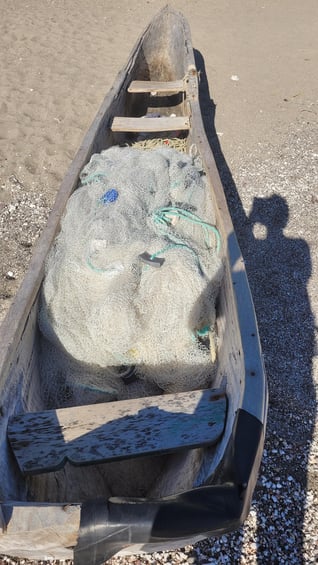
Foto: A fisherboat on the beach
Wednesday
Wednesday. Around 16 people are gathered around the table in our new meeting room. The room is painted white, with 4 large tables in the middle and simple plastic chairs along the edges of the tables and along the walls. Everyone in the room is listening intently. The sounds echo off the walls of the room, and it’s hard to understand what people are saying.
It's the morning report, handover from night shift to day shift. Did I hear correctly? There’s talk about a patient who has been in a coma waking up last night. Could it be true, or is it wishful thinking? Everything is in French. I still struggle sometimes to understand, especially in this room. My stomach is in knots.
When the report is finally finished, I almost run into Judeline’s room. The bed is a mess. The mosquito net is still folded up. The sheet is curled up in a corner. Judeline is agitated, extremely restless. She tosses herself from side to side, gets up, lies down, dangles her feet from the edge of the bed before bouncing back up and turning onto her stomach. We can barely get her to lie still for a moment to talk to her. Her eyes are closed, but she opens them when we say her name. She is oriented in time, but she does not know where she is, nor does she remember giving birth to her baby. She knows she was pregnant, but nothing more.
After 3 questions, she falls asleep again, before tossing and turning in bed again. So, it's true. Judeline has woken up. It has been a long time since I have felt such deep joy, relief and perhaps most of all, gratitude. I want to jump, dance, sing...
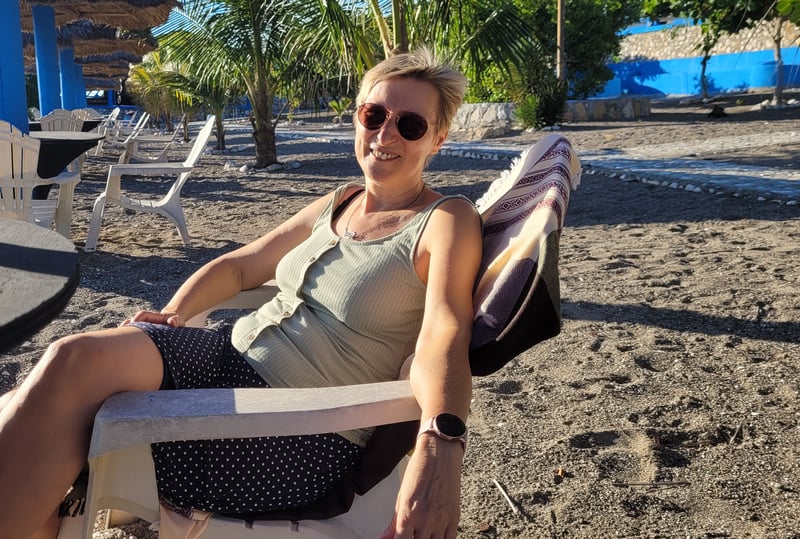
Foto: A calm Sunday relaxing on the beach
Thursday
Thursday. Judeline is sleeping peacefully in bed when we enter. We wake her up. She has beautiful brown eyes, a completely unique shape that I have never seen before. They are almond-shaped but small with a touch of strabismus, so that she always looks a little questioning. She can't quite focus, and sometimes she falls asleep while we are talking. However, she has now understood that she is in the hospital, and that she has a little boy. She wants to see him, and we have also received word from the neonatal ward that the boy needs his mother. The plan is therefore to start breastfeeding.
I am in the room when she nurses the baby for the first time. The aunt and the midwife have helped Judeline to sit up. She sways a little, can't quite keep her balance. Her gaze travels wildly in all directions, she does not understand what is going on. When the aunt approaches, she wants to hold the baby, but she can't. Her arms fall powerlessly to her side. The hospital shirt is open, the breast ready for the baby.
While the midwife holds Judeline, so that she does not fall, the aunt holds the baby to her breast. She holds the baby in Judeline's arm, making her feel like she is the one holding the baby. The boy immediately grabs the breast and begins to suck, powerfully. Judeline is completely stunned. She tries to see what is going on, looks down at the child but is unable to focus, to stay awake.
She falls asleep. I sit at the desk and look at them, with tears in my eyes. We help Judeline to lay back on her bed while the aunt takes the baby with her to the newborn ward. Will she make a full recovery?
Friday
Friday. We have learned the story of Judeline. She is an orphan, lives with an old grandmother. She is partly albino, which is why she has the slightly special skin and hair colour. There are some prejudices connected to this and she has therefore had a quite hard life. Judeline refuses to say who the father of the baby is, but it is clear that one cannot expect help from him. We hear that she always has been an introvert, she keeps to herself and is very shy. There is not much hope in her life.
Her aunt lives in the capital, Port-au-Prince, and it was just a coincidence that she was there on an errand when Judeline gave birth. This way she could take care of her and drive her to the hospital. If not, who knows what could have happened. Today, Judeline is in bed when I come, with the baby tightly snuggled to her breast. She has replaced the hospital shirt with her own clothes. She wears a light blue striped skirt with suspenders and a floral, slightly too big blue t-shirt. A large hole just above the right breast shows the skin. The baby lies on a wonderfully colorful white printed baby duvet. You can see red, green, blue and yellow balloons, ice cream, cars, planes, balls, and everything else a child could wish for. The baby is dressed in bright pink trousers, has yellow knitted socks on his feet and a pink hat. I wonder whether I have misunderstood, and it is a girl. But it's a boy 😊
He suckles hard, seems very pleased. And once again I have to fight back the tears. According to the aunt, this is an unwanted pregnancy. I don’t believe that. There is so much love in Judeline's eyes as she lies with her son, so much pride and spark of life. The pregnancy may not have been planned, but it is quite clear that the child is wanted. The two are in perfect harmony. You feel a calmness around them that I have rarely seen in a new mother. A calmness that fills my heart with love and, once again, gratitude.
Will this little child be the hope that she may not have had? A meaning in her life? It seems like it to me.
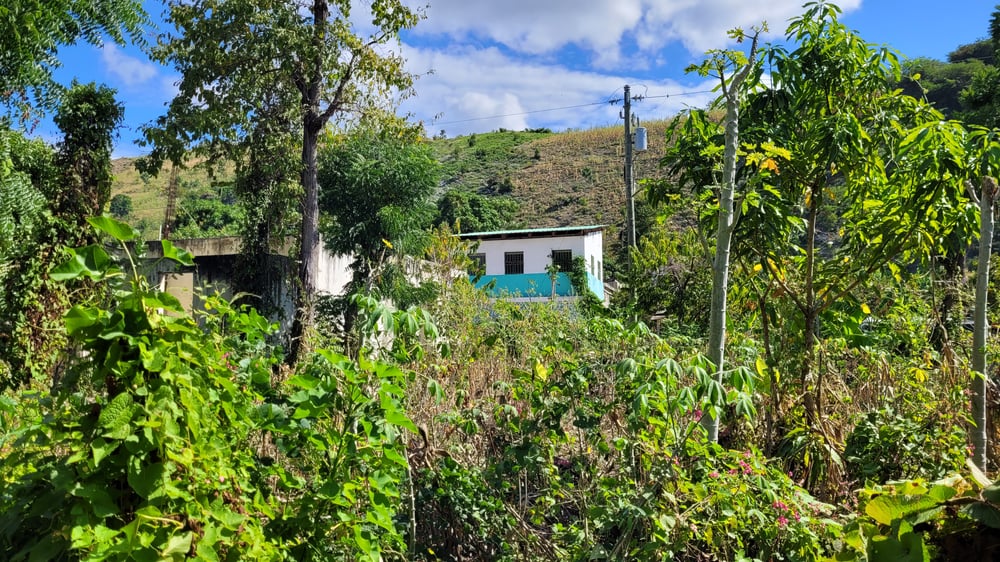 Foto: A beautiful house in the hills of Port-a-Piment
Foto: A beautiful house in the hills of Port-a-Piment
Wednesday
Wednesday. Judeline is ready to go home. Her hair is freshly braided, and she has put on new blue jeans for the day. The boy is also dressed in blue. She is sitting in a chair, the baby on the bed in front of her. Her small brown eyes are following the baby, and everything that happens around her. And that's how I've seen her these past few days. She doesn't say much, she sits and observes.
When the boy cries, she takes him to her breast and nurses him, calmly, relaxed, lovingly. Now she picks up the boy, and he wakes up. He lies in the crook of her arm and looks around attentively. He has the same eyes as his mother. As they leave, Judeline waves and smiles, a wide big smile that she's been sharing with us generously for the past few days. A smile that makes her eyes light up and that opens all hearts. She seems happy. I look after them for a long time.
I will never forget her smile and those beautiful, brown, very special eyes. I know they will be fine. They are strong, these two <3
** Name is changed to keep anonymity
Les blogginnlegg 1 og blogginnlegg 3 fra turen til Haiti her.

